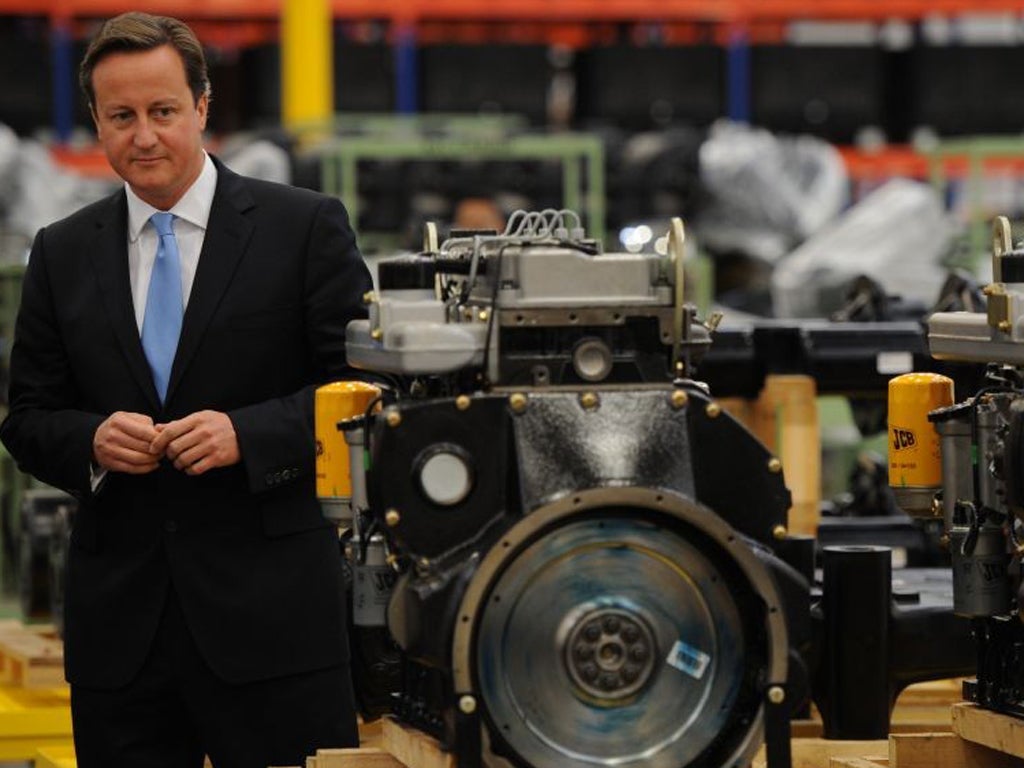Printing money has helped only the rich
The PM is quick to don his hard-hat, but he must also invest in infrastructure


Do our political masters ever listen? They’re very good at being seen to look active and concerned – donning hard hats for photo opportunities, wearing their serious face, rushing around, appointing experts to hold reviews – but do they actually get it?
The reason I ask is that Nigel Wilson, the chief executive of Legal & General, spoke more sense as he reported the company’s annual results this week than any business figure I can recall in recent times. L&G’s performance is not the nub of it, although the figures were good. Profits were up 10 per cent, to £1.13bn and investors received a tidy 22 per cent hike in their dividend. So Wilson is no slouch.
It’s what he said about the lack of investment in UK infrastructure that ought to be made required listening for politicians and their legions of advisers. If I was David Cameron, I’d cut the power breakfasts, the oft-repeated spectacle of our captains of industry trooping into 10 Downing Street for croissants and orange juice, and get Wilson in for a private chat. And do it now. And, for God’s sake, David, don’t just nod and look earnest, and don your familiar frown, but actually take into account what is he saying – and do something about it.
Because what Wilson said about the state of our nation, and its future, was profound. Only yesterday, I was listening on the radio to a couple of economists saying how brilliant the Bank of England’s £375bn quantitative easing programme had been. Stability had been achieved, the economy was recovering.
Yet, here is Wilson. QE had been a “great initial success” but it had also “created a lot of cheap money with nowhere to go”. It had been “fantastic for rich people”, said Wilson. “We have seen asset price inflation that has made the wealthy wealthier.”
Then, he said this: “But we are underinvested. The world is awash with liquidity but we have to make Britain a more attractive place to invest.” He went on to pour scorn on the Government’s National Infrastructure Plan, describing it as little more than a “wish-list, of which £220bn is energy and £120bn transport”.
In other words, all that cash was printed, to pump prime the economy, and it’s not gone into items of lasting value. Instead of investing it in improving our gas and electricity supply, upgrading our rail and road links, the money had disappeared into the hands of the super-rich, many of whom are parked offshore.
A tremendous opportunity had been lost. Worse, as we now go forward, political uncertainty hangs over our attempts to make the country a better place, to put its infrastructure on a par with that of our go-getting rivals. Companies were unwilling to commit to the UK because the Westminster climate was too clouded. Here’s Wilson again: “There is extreme political risk because you are not sure what this government is going to do or the following one. You can invest, and find that the rules are changed.”
Why would anyone pour their money into energy, for instance, when Labour has said it will freeze prices? It “makes it a much more difficult industry to invest in,” said Wilson.
What there is not is a joined up, medium to long-term infrastructure schedule for the UK, on which all the main political parties are agreed. As a result, billions of pounds are going wanting. Take L&G. It has a whopping £450bn under management. How much is tied up in infrastructure? A paltry £5bn.
That is a damning statistic. One that should make any Prime Minister seeking a lasting legacy hang their head in shame.
Even if he wanted to, however, there is precious little for Wilson to spend the money on. “We just don’t have the oven-ready projects,” he complained. L&G is one of six insurers to pledge a combined £25bn in infrastructure over the next five years. L&G alone could put up £15bn.
What’s happened? Er, virtually nothing, such is the painful, cumbersome journey through bureaucracy, planning and red tape that passes for progress in the UK today. Wilson went so far as to attempt to speed it up. “I set up Project Tiger. It’s been such slow going, it’s been renamed internally Project Sloth.”
This is condemnatory stuff that makes a mockery of our all-action Premier and his colleagues with their penchant for holding press conferences on building sites and in factories. When I was a child, I had an Action Man toy. It also had real hair, just like Cameron and co, and, listening to Wilson I realise, was about as effective.
Even when we do have a big ticket item, HS2, it is not the right choice. Wilson is correct when he says it “started off as a cynical way to get votes in the north”. It’s simply not needed – by the inhabitants of Leeds, Manchester and Birmingham, and least of all by the folk at the other end, in London.
What is required is faster, more efficient rail services between the Northern and Midlands conurbations. That would be money more wisely spent, and quicker to achieve, too.
A favourite government ploy, along with the photo calls and expert reviews, is to appoint a tsar. It’s a sign that ministers are at a loss with what to do, and want someone else to carry the can. Sure enough, we have one for infrastructure. He’s called Paul Deighton and he was responsible for delivering the London Olympics on time and within budget.
Deighton, previously at Goldman Sachs, is a genuine “can-do” person. Memo to Cameron: hear what Wilson has to say, get him in, and then give Deighton full rein. Oh, and scrap HS2.
Join our commenting forum
Join thought-provoking conversations, follow other Independent readers and see their replies
Comments